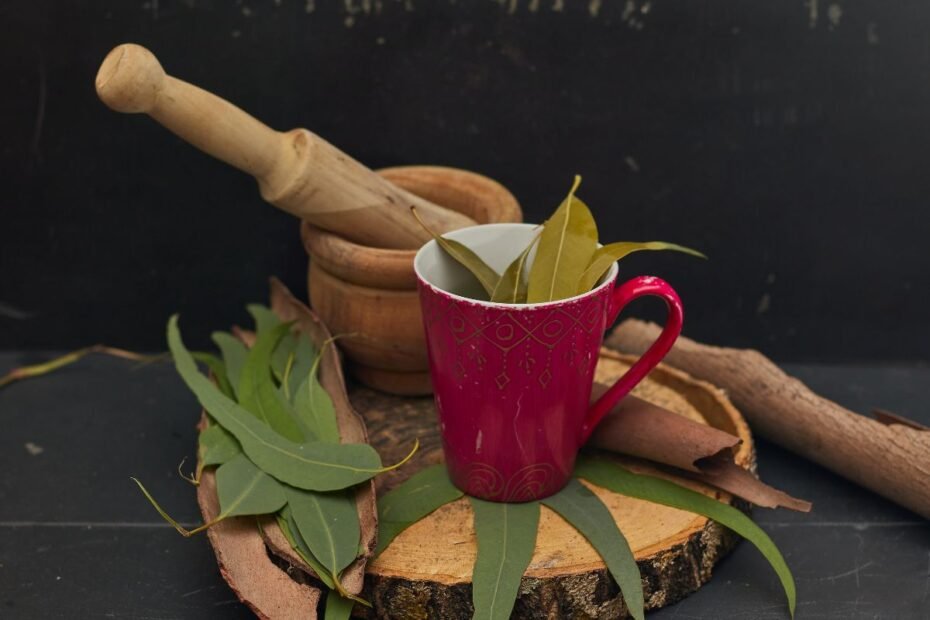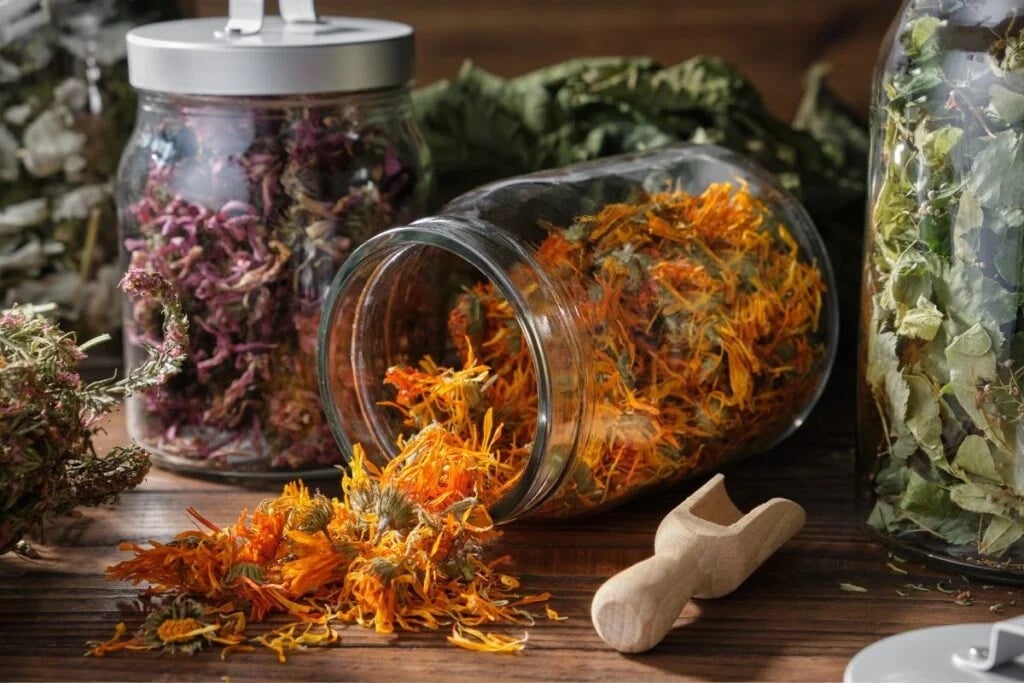Colds, coughs, flu, sore throats—all the things that come with the cold season. What are the first things we do to fight off colds? Of course, a warm, steaming, healing cup of tea comes first. Eucalyptus tea is one of those highly recommended for colds. The strength of eucalyptus tea is its ability to treat this type of illness. What determines the healing properties of this tea, how to prepare and consume it—all this and more in this article.
Eucalyptus: The Tree of Warm Countries
Eucalyptus (Eucalyptus) is an evergreen tree belonging to the Myrtaceae family. The eucalyptus trees are native to Australia and the surrounding islands. Elsewhere in the world, these trees are grown in tropical and subtropical climates.
There are approximately 500 known species of eucalyptus. The most common is the globular eucalyptus (Eucalyptus globulus), which humans use for their needs.
Eucalypts are very fast-growing tall trees. It can grow to more than 100 m in height and have a trunk diameter of up to 7.5 m. Eucalyptus leaves are elongated, lanceolate, glossy, and grayish-green. They bloom with whitish, broom-like flowers.

What is The Healing Power of Eucalyptus?
The healing power of eucalyptus is in its leaves. The leaves serve as material for eucalyptus essential oil production and healing tea. Eucalyptus leaves are rich in intense chemical compounds, giving the leaves healing properties.
The essential substance in eucalyptus leaves is cineole or eucalyptol. The leaves are rich in flavonoids, for example, catechins, isorhamnetin, luteolin, kaempferol, phloretin, and quercetin. Eucalyptus leaves also contain tannins.
All these active substances, which sound like a bunch of watchwords, give eucalyptus leaves their effective anti-inflammatory, antioxidant, and antimicrobial properties. Eucalyptus leaf preparations can fight infections and viruses, suppress inflammation, and protect the body from free radical damage. All of this can help treat diseases and prevent them.
Research and Results on The Eucalyptus Therapeutic Properties
The use of eucalyptus leaves for remedial purposes is not only based on the experience of traditional medicine. Scientists studied these leaves for their healing potential, and the results confirmed their health benefits indeed.
The history of eucalyptus leaf therapy dates back to indigenous communities in Australia, where they use the leaves to reduce fever. In the 18th century, James Cook (1728–1799), a traveler, geographer, and one of the first explorers of the Australian continent, introduced the plant and its healing powers to Europeans. Nowadays, eucalyptus is cultivated in Asia, Africa, America, Mediterranean Europe, the Indian subcontinent, and elsewhere.
Eucalyptus was introduced to Europe in the 19th century. Interestingly, most English hospitals used eucalyptus oil as a urinary catheter cleaning and disinfecting source by the end of the 19th century. Modern research supports this practice. Serbian researchers in a 2016 study provided evidence to support the antimicrobial effects of eucalyptus.
The University of Maryland Medical Center writes about the power of eucalyptus to fight fungi and bacteria and treat skin infections and wounds.
The study in the Clinical Microbiology & Infection journal suggests that eucalyptus essential oils may have an antibacterial effect on pathogenic upper respiratory tract bacteria, which cause various infections. It is a reason why eucalyptus has an advantage in treating respiratory diseases.
Clinical studies confirmed the effect of eucalyptus on relieving asthma symptoms. A group of bronchial asthma patients taking 600 mg of eucalyptus daily for 12 weeks required 36% less medication to control their asthma attacks compared to a control group taking a placebo.
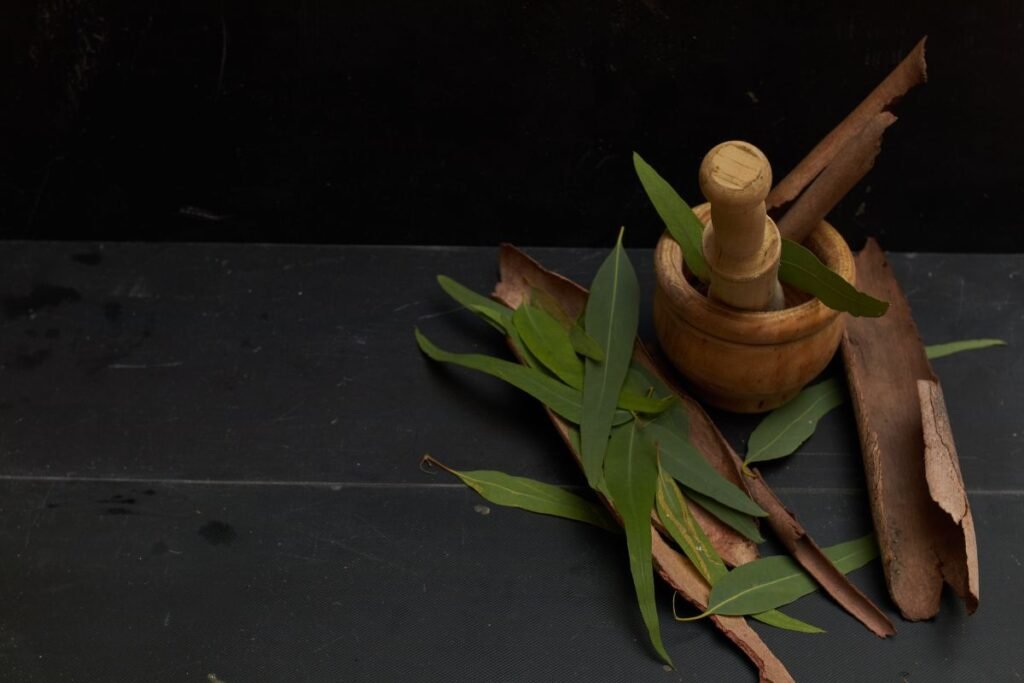
Eucalyptus Tea for Treating Diseases
This plant leaf is widely used as a natural remedy for colds and is a common ingredient in cold and cough products. Eucalyptus tea is recommended for bronchitis, asthma, and other upper respiratory diseases, including those caused by seasonal viruses. Eucalyptus drink is also suitable for digestive ailments, as well as mouth and gum problems.
Here’s what eucalyptus tea can do:
- The antibacterial properties of eucalyptus tea can help treat the underlying cause of respiratory illnesses and speed up recovery in the case of colds, flu, or tonsillitis.
- This tea can help reduce fever.
- It can help reduce throat irritation and disinfect the respiratory tract as an expectorant.
- The tea liquefies mucus and eases expectoration.
- It may be effective for allergic rhinitis or sinusitis. It may help reduce snoring.
- Take the eucalyptus tea to improve digestion. This tea works as a cleanser of toxins from the intestines.
- It can help treat oral infections and gum disease and prevent plaque and bacteria buildup and bad breath.
- Use this tea as a remedy for mouth ulcers.
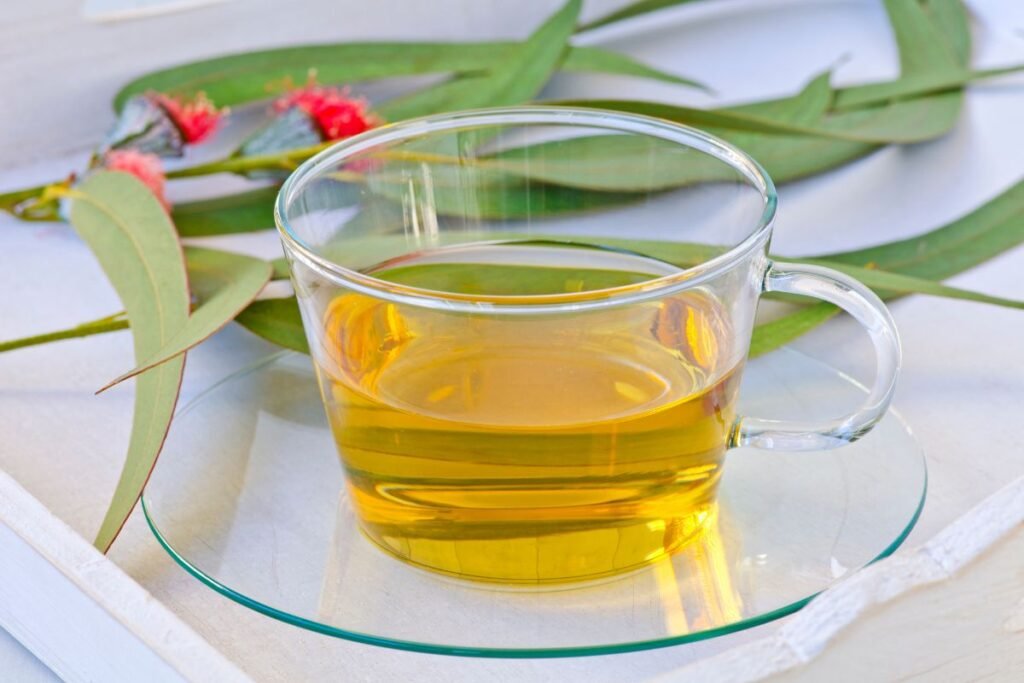
Eucalyptus Tea as a Preventive Medicine
Eucalyptus tea treats diseases and prevents them. A cup of eucalyptus tea can help strengthen the immune system.
Drink eucalyptus tea:
- To lower blood sugar levels and boost insulin production. It can help to prevent the onset of diabetes. However, if you already have diabetes, check with your doctor before drinking this tea.
- You want to improve blood circulation and lower blood pressure to prevent heart disease and other related health problems.
- You want to detoxify your liver and cleanse your kidneys. It helps reduce the problem of acne-prone skin.
- To treat bladder problems. This tea can help treat a bladder infection or fight cystitis.
Eucalyptus Tea for External Use
Use cooled eucalyptus tea as a cleanser and disinfectant for skin wounds. It helps with affected or mechanically damaged skin, such as cuts, burns, etc. In addition to its disinfectant properties, eucalyptus tea has a cooling effect.
Use warm eucalyptus tea to make the compresses and apply them to wounds, swellings, bruises, and scars. Eucalyptus tea compresses can help with muscle pain, rheumatism, and joint stiffness.
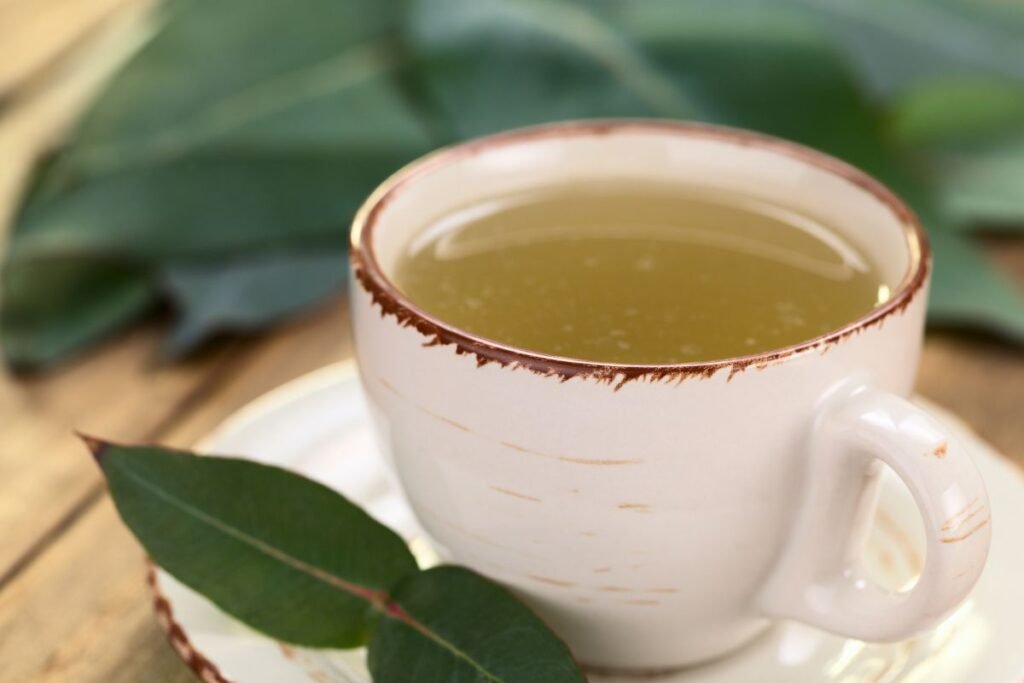
Eucalyptus Tea: Tips for Proper Preparation
Make eucalyptus tea from dried eucalyptus leaves. Eucalyptus is not usually cultivated in many countries, so we use readily available raw materials. It is a safer option to use dry material instead because the concentration of active substances in fresh eucalyptus leaves is too high, increasing the likelihood of overdose. There is another warning: never use eucalyptus essential oil in your tea; ingesting it can even be deadly.
Eucalyptus tea has a robust, woody aroma and a pale greenish color. When steeped for a long time, this tea becomes bitter. Pay attention to the intensity of the tea you want to brew.
For Eucalyptus tea, you will need:
- 1-2 teaspoons of dried eucalyptus leaves,
- 250 ml of water.
Place the raw eucalyptus leaves in a cup or tea infuser and fill with boiling water. Cover and soak for 5–10 minutes. The longer the steeping causes, the more bitter the tea tastes. Strain, add honey if desired, and drink.
Use honey in eucalyptus tea for colds or sore throats. Mix eucalyptus leaves with peppermint, chamomile, sea buckthorn, or thyme for a more concentrated remedy for cold treatment. Add crushed garlic cloves to eucalyptus tea to help soothe the nose.
If you drink the tea for therapeutic purposes, the recommended dose is 3–4 cups daily. If you drink this tea as a preventive measure, 1-2 cups are sufficient.
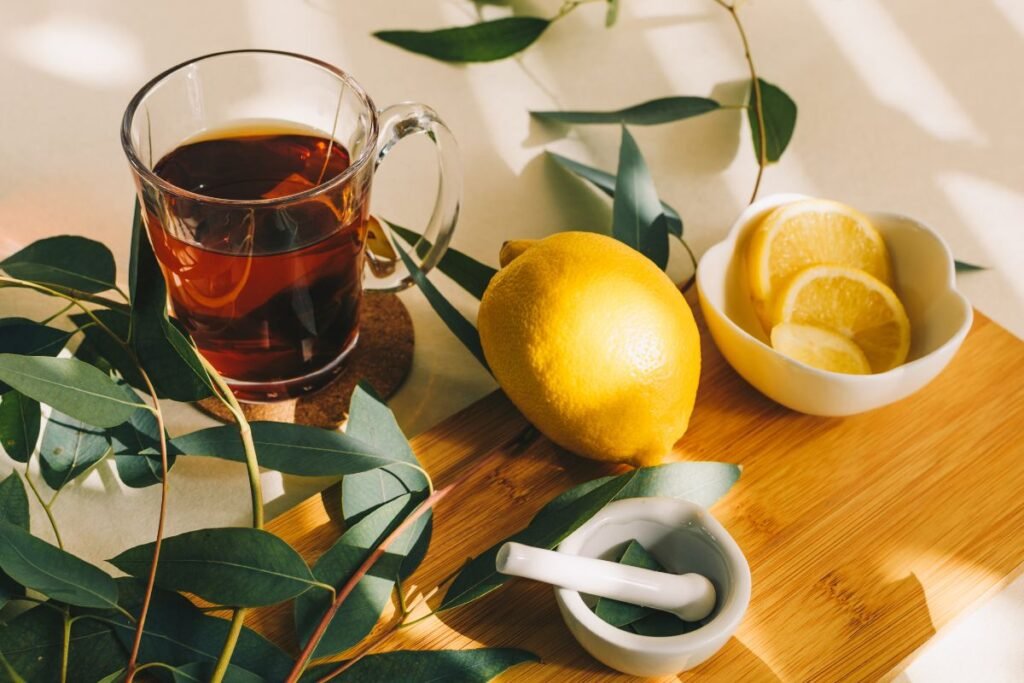
Eucalyptus Tea: More Health-giving Possibilities
Inhalations. Add eucalyptus tea (or a couple of drops of essential oil) to a bowl of hot water and breathe in the steam. It will help with nasal congestion, sinusitis, and a runny nose. It will also rinse and disinfect the nasal mucosa.
Bath. Add dried eucalyptus leaves to a warm bath. Lying in such a bath helps to relax and treat skin diseases. It also helps with colds, but not with a fever.
Skin cleansing. Make a cleansing tonic from eucalyptus tea mixed with dandelion, licorice, and fennel seeds for acne-prone skin.
Eucalyptus tea can improve dry skin. Take it topically by moisturizing the skin with a tea-soaked tampon.
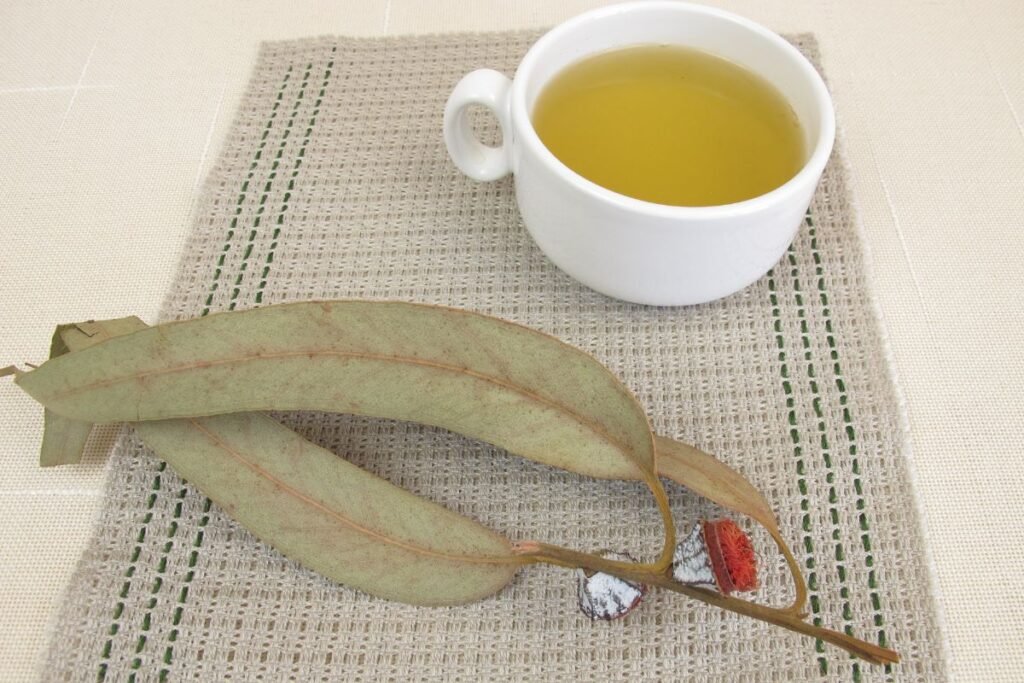
Eucalyptus Tea: Between Health and Harm. When Do You Need Some Extreme Caution?
Eucalyptus leaf tea is generally considered safe. Although rare allergic reactions such as nausea, vomiting, diarrhea, and breathing difficulties (similar to asthma attacks) may occur. However, these reactions have more potential in the case of an overdose of tea.
Nevertheless, it is better not to drink eucalyptus tea (or to consult a doctor first):
- People with diabetes;
- If you have the scheduled surgery, use eucalyptus tea at least two weeks before;
- Then you have gastric ulcers or gastritis;
- If you are taking medication for high cholesterol, stomach acidity, or mental disorders;
- Pregnant and breastfeeding women and children.
The most important thing to remember is that eucalyptus essential oil can cause health and life-threatening side effects if ingested. However, this oil can cause allergic skin reactions even when used externally. Use it diluted or with a 24-hour skin tolerance test at the beginning.
Research:
https://pubmed.ncbi.nlm.nih.gov/30249328/
https://medlineplus.gov/druginfo/natural/700.html
https://pubmed.ncbi.nlm.nih.gov/24261680/
https://pubmed.ncbi.nlm.nih.gov/12645832/
https://pubmed.ncbi.nlm.nih.gov/21696405/
https://pubmed.ncbi.nlm.nih.gov/29670385/
https://pubmed.ncbi.nlm.nih.gov/18672986/
https://www.medicalnewstoday.com/articles/266580
Associative photos © Canva.
